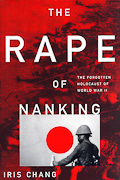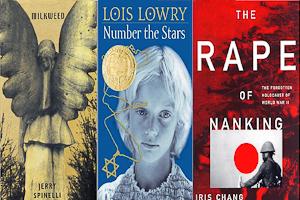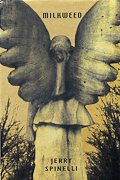Every year seniors travel to the Holocaust Museum in Washington D.C., listen to Holocaust survivors speak, and read “Night” by Elie Wiesel, a memoir about Wiesel’s experience at death camps during the Holocaust. Learning about the Holocaust helps to educate students about the horrors that can come from unexplained hate. There are many books, fictional and non-fictional, written about the Holocaust that provide more insight into the hate and pain that Jews and other victims experienced. For those who want to further their knowledge of the Holocaust, “Milkweed” and “The Rape of Nanking” are great books to read.
I first read “Milkweed” by Jerry Spinelli in middle school, yet I still enjoy reading it today. “Milkweed” is written for a target audience of young adults, but it can be enjoyed by a range of people from fifth graders to adults because of its easy readability and exciting and action-filled plot.
Spinelli’s novel is the fictional story of a young orphan named Misha who is living in Warsaw, Poland during World War II. Misha joins a band of young Jewish thieves who are also orphans and are led by an older boy named Uri.
After the arrival of the Germans, the Jews including Misha, Uri, and their friends are moved to the ghetto. Conditions become worse and Misha is forced to sneak out of the ghetto, risking his life, to steal food. Eventually the ghettos start to be cleared and Misha has to try to avoid deportation in order to survive.
Spinelli takes a look at the Holocaust from the unusual point of view of an innocent young boy. This angle accurately conveys that many people did not know exactly what was going on during the Holocaust. It also creates dramatic irony because readers know the purpose of the Jackboots and what will happen to the Jews after they are deported.
Spinelli also highlights a portion of the Holocaust that does not get much attention: the ghettos. Most Holocaust books are about the concentration camps. “Milkweed,” however, shows how poorly Jews were treated before they were even deported to the camps. Jews were murdered, beaten, and humiliated by the Germans.
Although “Milkweed” is a sad book that brings many horrifying tragedies to light, it is also thrilling and exciting. The short sentence structure and the abundance of action make the novel fast-paced and exciting for readers. It’s almost impossible to put it down.
“The Rape of Nanking – The Forgotten Holocaust of World War II” by Iris Chang
“The Rape of Nanking- The Forgotten Holocaust of World War II” by Iris Chang focuses on the systematic annihilation of a people, but has several differences compared to other books about the subject. While most Holocaust books focus on the human aspects of the massacre of people, “The Rape of Nanking” takes a more historical and anthropological look at the terrors committed by Japanese soldiers in the then capital of China.
Divided into three parts, the book looks at several different perspectives on the massacre itself, the reaction after the war, and the reason that it is not widely known. The different perspectives in part one are the Japanese soldiers, the Chinese victims, and the others who tried to help them.
Chang is missing one vital ingredient to a great historical book in that she didn’t actually live through what she wrote about. She says in her introduction that she grew up hearing stories, but that doesn’t come close to an eyewitness account. Despite this unavoidable fault, she created a generally cumulative view of the different circumstances surrounding the Nanking Massacre, and tried to make the historical aspects accessible to the reader.
Chang didn’t shy away from describing the horrors of the war. She described murders and rapes that took place in excruciating detail, and made it as personal as she could. Describing the pregnant women who were raped and had their bellies slashed open was an unforgettable part of the book, and some of the best writing as well.
While the subject was absolutely riveting and the book itself was well-written, it did tend to get a little dull at times. It is best suited for those very interested in the subject and willing to persevere through some of the drier pieces of history relating to the Second Sino-Japanese War. Still, it is well worth the time, especially as a reminder that history can repeat itself if we do not prevent it from doing so.
Mary Kate Luft is an A&E Editor and Martha Schick is the Multimedia Chief for The Patriot and jcpatriot.com




